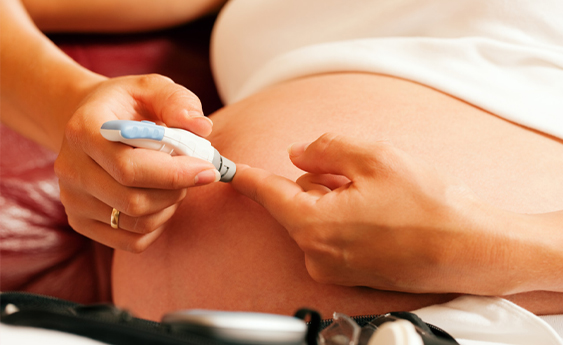PREGNANCY
The influence of bad mood on pregnant women with gestational diabetes mellitus
Checking everything before pregnancy is normal. Suddenly diabetes during your pregnancy is scary. Why do you have diabetes during pregnancy? Did you eat it? How to treat? Does it affect the baby? This series of questions and fears make pregnant women fidgety, anxious and sleepless, but this will only aggravate the condition and is not conducive to childbirth.
Gestational diabetes mellitus (GDM) is a kind of diabetes only when the glucose metabolism is normal or the potential glucose tolerance is decreased before pregnancy and occurs or is diagnosed during pregnancy. It is a common complication of pregnant women, which occurs in the middle and late stages of pregnancy, and has an increasing trend in recent years. According to the relevant data, the incidence rate of GDM in the world is 1%~14%, and the incidence rate of GDM in China is reported in about 2.31%~4.3%[1-2].
It’s not all about "gluttony"
Many pregnant women will blame themselves when they are diagnosed with diabetes, and think that it is the reason for their "gluttony". In fact, GDM is not only closely related to diet structure, but also related to family history of diabetes mellitus, weight before pregnancy ≥ 90kg, birth weight of pregnant women ≥ 4000g, and elderly parturient women etc.
In addition, in the middle and late period of pregnancy, hormones such as placental lactogen, estrogen, progesterone, cortisol and placental insulin enzyme gradually increase, and these hormones have the effect of insulin resistance, which makes the sensitivity of pregnant women to insulin gradually decrease. In order to maintain the normal level of glucose metabolism, the insulin demand of pregnant women increased compared with that before. When the islet reserve function of pregnant women is insufficient or the insulin secretion is reduced, the blood sugar will rise and GDM will appear.
Understand the state of illness and straighten out the state of mind
Pregnant women are often frightened by the serious complications of GDM, such as infection, abortion, premature delivery, fetal malformation, etc. But in fact, the influence of GDM on pregnant women and fetuses depends on the condition of pregnant women and the level of blood glucose control. Only those with severe condition or poor blood glucose control will have adverse consequences. On the other hand, many pregnant women lack of psychological preparation and worry about complications, which will produce a series of bad emotions, which will also seriously affect the treatment and rehabilitation of all aspects of pregnancy, childbirth and postpartum.
The harm of GDM pregnant women’s unhealthful psychology
GDM pregnant women often worry about the normal development of the fetus, and are prone to anxiety, fear and other stress states. At this time, the sympathetic nerve is excited and will inhibit insulin secretion. At the same time, studies have confirmed that mothers in stress state during pregnancy will affect fetal neural development, resulting in delayed intellectual development and temperament development of children [6-7].
In the process of delivery, GDM pregnant women will have low glucose utilization, resulting in energy shortage, prolonged labor process, and aggravating the anxiety and impatience of pregnant women. The change of mood will also cause the secretion of a large number of stress hormones, which will increase blood glucose. During delivery, uterine atony, prolonged labor, postpartum hemorrhage and neonatal asphyxia are easy to occur [3].
In addition, postpartum GDM mothers’ attention is all on their babies, so they are easy to ignore their own insulin treatment, and occasionally have hypoglycemia. A small number of parturients have distress and depression due to their babies with congenital diseases, and those who are serious can develop postpartum depression [3].
Psychological intervention adjuvant therapy
In view of the unhealthy psychology of pregnant women, the family should actively support and persuade. If pregnant women are still unable to accept the disease and actively cooperate with the treatment, psychological intervention is needed. Some studies have shown that after psychological intervention, pregnant women with gestational diabetes mellitus not only reduce the blood glucose value of pregnant women, but also improve the negative emotions of anxiety and depression, and reduce the incidence of postpartum complications and neonatal asphyxia [4].
Commonly used psychotherapy such as cognitive psychotherapy, group psychotherapy, expectation therapy, etc. Through communication with psychiatrists and patients’ friends, pregnant women’s feelings are released, thus reducing the tension and anxiety. Moreover, they can understand their own state and disease knowledge more clearly, and realize self acceptance and active treatment. Some experiments have proved that [5] group psychotherapy can improve the knowledge, efficacy and skill level of patients, improve the quality of life and clinical efficacy of GDM.
Therefore, pregnant women with gestational diabetes, do not panic. The most important thing is to control the blood glucose within the satisfaction standard range: no obvious hunger, fasting blood glucose control is 3.3 ~ 5.6mmol / L; 30 minutes before meal: 3.3 ~ 5.8mmo1 / L; 2 hours after meal: 4.4 ~ 6.7mmol / L; at night: 4.4 to 6.7mmol / L. As long as you strictly cooperate with your doctor’s order to control blood glucose and maintain a good attitude, you can also give birth to a healthy baby.
References
[1] Gu Ying, Xu Qian, Fu Jinyan, et al. The Effect of Comprehensive Intervention on Cognition and Pregnancy Outcome of Gestational Diabetes [J]. Shanxi Medical Journal, 2016, 45 (16): 1892-1894
[2] Xie Nuo. Analysis of Risk Factors of Gestational Diabetes [J]. Journal of China Medical University, 2016, 45(5): 476-477
[3] Fei Meijuan. Psychological characteristics and nursing of pregnant women with diabetes mellitus in pregnancy [J]. General nursing, 2010(8): 12: 3144-3145
[4] Jin Qimei. Psychological Care for Anxiety and Depression of Pregnant Women with Gestational Diabetes [J]. new world of diabetes, 2018(15): 105-106
[5] Liu Jian’an, Gao Ding Guo, Gao Xiao Hong, et al. Effect of Group Psychotherapy on Gestational Diabetes [J]. Chinese Journal of health psychology, 2013(6): 939-942
